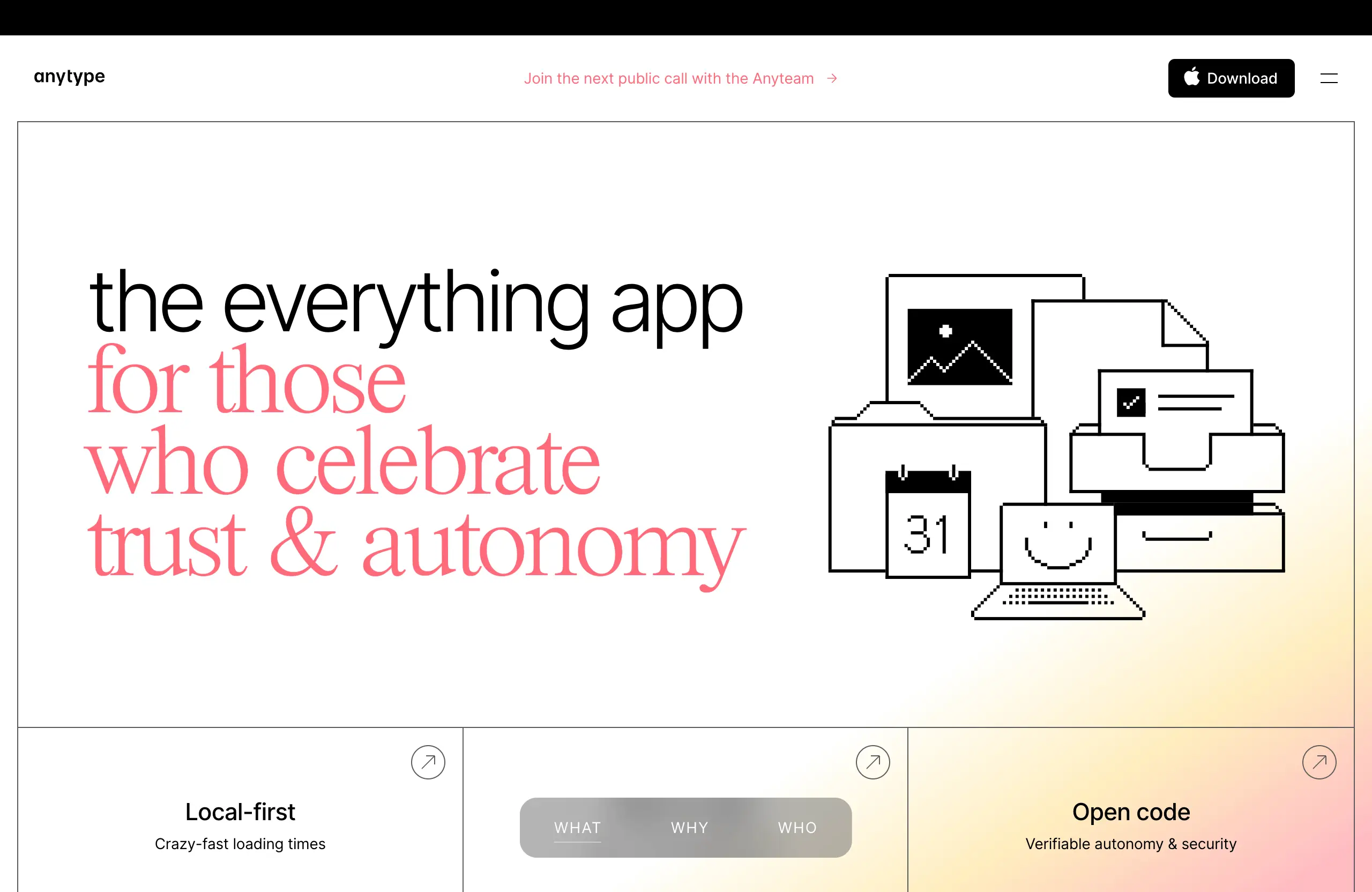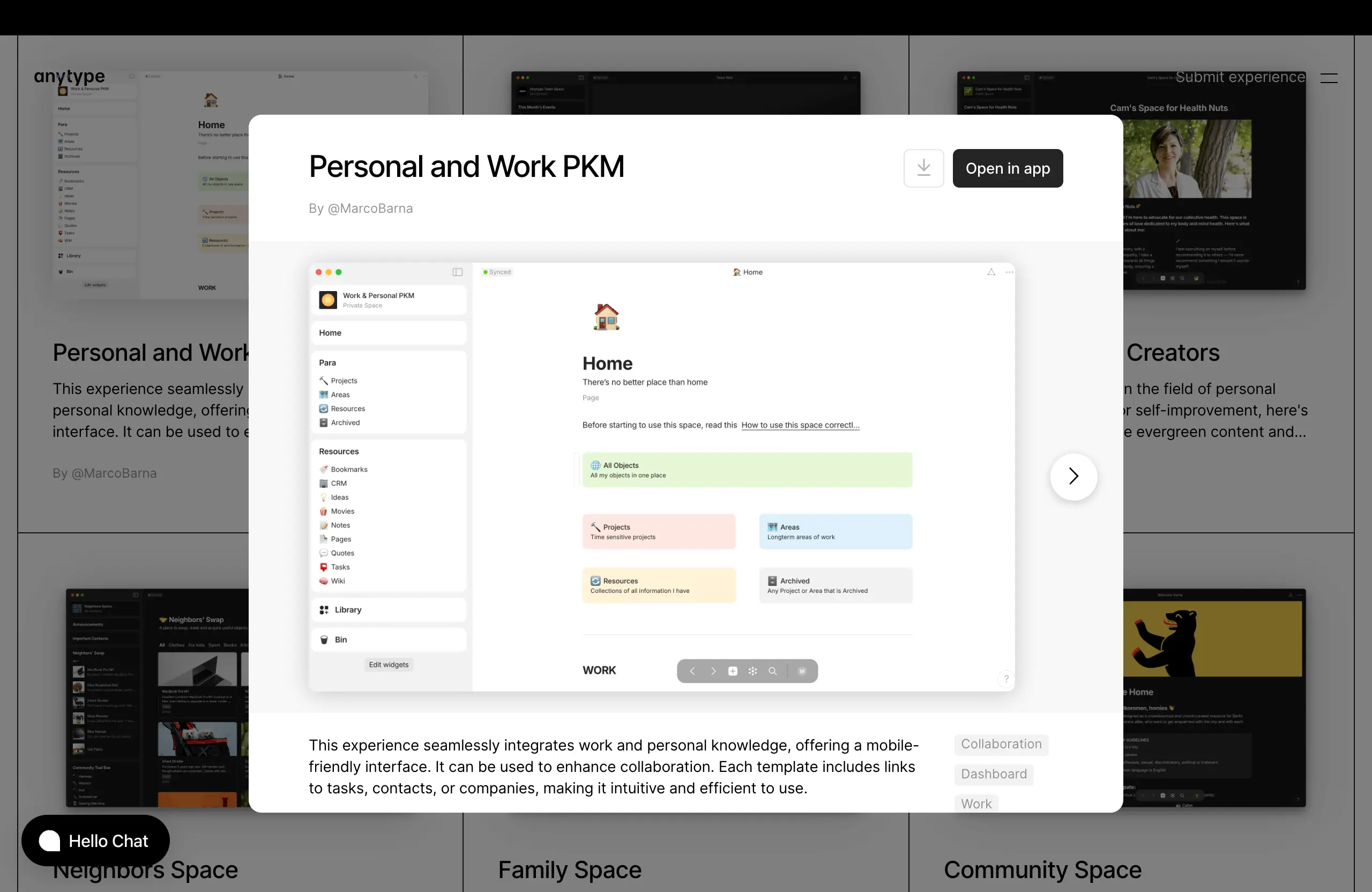Why Anytype Could Be Your Notion and Obsidian Alternative in 2025
Is Anytype the best Notion and Obsidian alternative for 2025? Dive into its local storage, P2P sync, and dynamic databases for privacy-focused users.
- Carrie
- 8 min read

In an era of information overload, where Notion’s cloud-based all-in-one solution and Obsidian’s local linked network dominate, a new tool called Anytype is emerging as a compelling alternative.
This article explores Anytype’s unique appeal, practical applications, and future potential.
1. What is Anytype?
Software Overview
Anytype is a Markdown-based, decentralized personal knowledge management and productivity tool designed to help users organize information non-linearly and build a personal knowledge base.
More than just a note-taking app, Anytype is an all-in-one platform integrating notes, databases, task management, and collaboration. Its core philosophy is “data sovereignty,” emphasizing complete user control over data, with default local storage and end-to-end encryption for privacy and security.
Developed by an international team, Anytype launched its first Beta version in 2023 and supports multiple platforms, including Windows, macOS, Linux, Android, and iOS. Its clean, intuitive interface combines Notion’s modular design with Obsidian’s bidirectional linking, prioritizing offline use and decentralized storage. Users can create notes, task lists, databases, or even personalized knowledge graphs, making it adaptable for scenarios like studying, writing, project management, or personal journaling.
Unlike other tools, Anytype’s decentralized network (P2P sync) allows data synchronization across devices without relying on cloud servers, with data stored locally or on user-specified nodes. This approach enhances privacy and eliminates risks associated with cloud service disruptions. Additionally, Anytype follows an open-source protocol, encouraging community-driven development, which boosts transparency and extensibility.
User Base
Anytype is rapidly growing, though official user numbers are undisclosed. According to Fahim AI’s data from late April 2025, Anytype has surpassed 500,000 users.
The community’s vibrancy reflects this growth. The Anytype Community Forum and Reddit’s r/Anytype subreddit (with ~50,000 subscribers as of May 2025) show active engagement from students, researchers, developers, and content creators, particularly in privacy-conscious regions like Europe and North America. Discord servers and Chinese-speaking communities also host lively discussions, with users sharing templates, plugins, and tips.
Compared to Notion’s tens of millions or Obsidian’s million-plus users, Anytype remains niche but has significant potential due to its decentralized ethos and free model (personal use is free, with premium features requiring a subscription).
 Anytype Personal Management Template
Anytype Personal Management Template
2. Why People Use Anytype
Key Features
Anytype stands out in the crowded knowledge management space with the following highlights:
1. Local-First with End-to-End Encryption
- Data Sovereignty: All data is stored locally by default with end-to-end encryption, ensuring users retain full control without privacy concerns tied to cloud services.
- Offline Access: Edit and access notes without an internet connection, ideal for travel or unstable networks.
- Decentralized Sync: P2P networking enables cross-device synchronization without third-party servers, balancing security and flexibility.
2. Flexible Block-Based Editing and Databases
- Block-Based Editing: Like Notion, Anytype supports modular content blocks (text, images, tables, code, etc.), allowing drag-and-drop reorganization.
- Dynamic Databases: Create custom databases for project management, literature indexing, or personal book lists, rivaling Airtable’s functionality.
- Template System: Offers pre-built templates (e.g., journals, task trackers) or custom ones to streamline repetitive tasks.
3. Bidirectional Linking and Knowledge Graphs
- Bidirectional Linking: Use
[[Note]]to create links between notes, automatically generating backlinks to form a knowledge network. - Knowledge Graphs: Visualize note connections in a dynamic graph, uncovering hidden relationships and sparking inspiration.
- Non-Linear Thinking: Mimics the brain’s associative patterns, ideal for research, writing, and creative ideation.
4. High Customization and Open-Source Ecosystem
- Customizable Interface: Supports theme switching, font adjustments, and layout optimization for a tailored experience.
- Open-Source Protocol: Partially open-source code allows the community to develop plugins or extensions, with potential for an Obsidian-like plugin ecosystem.
- Cross-Platform Consistency: Seamless experience across desktop and mobile with reliable sync.
5. Collaboration and Sharing
- Team Collaboration: Supports multiplayer editing (available in Beta), suitable for small teams or families.
- Shared Spaces: Create public or private spaces to share notes or databases, similar to Notion’s shared pages.
 Anytype’s Knowledge Graph, visually showcasing note connections
Anytype’s Knowledge Graph, visually showcasing note connections
Why People Choose Anytype
Anytype’s unique design caters to diverse needs. Key reasons include:
- Privacy and Security: Local storage and encryption attract privacy-conscious users like developers and researchers in an era of frequent data breaches.
- Second Brain Building: Bidirectional linking and knowledge graphs help users organize complex information, ideal for students, academics, and creators.
- Versatile Productivity Tool: From personal journals to project management, Anytype serves as a Notion alternative.
- Free and Open-Source: Free for personal use, lowering barriers; open-source builds trust and appeals to tech enthusiasts.
- Decentralized Trend: Aligns with Web3 and decentralization, resonating with users seeking data autonomy.
- Cross-Use Cases: Supports studying, writing, task tracking, and team collaboration, addressing diverse needs.
3. How to Use Anytype
Anytype’s user-friendly interface may require a learning curve for its block-based editing and bidirectional linking. The official documentation and popular tutorials can help you get started quickly.
Getting Started
- Download and Install: Visit the Anytype website to download the version for your device (macOS, Windows, Android, etc.).
- Create a Space: After installation, set up a “Space” (similar to Obsidian’s Vault) to store notes and databases.
- Add Content: Use the block-based editor to create notes, tasks, or databases, and try
[[Note]]for bidirectional links. - Explore the Graph: Open the “Graph View” to visualize note connections.
- Set Up Sync: Enable P2P sync for consistent data across devices.
Popular YouTube Tutorials
Danny Talks Tech: Anytype vs. Notion and Obsidian
This video shares a seasoned Obsidian user’s first impressions of Anytype, comparing it to Obsidian and Notion.
Anytype blends Obsidian’s graph view with Notion’s database capabilities, supporting Markdown, slash commands, and a sleek interface. Editing features include lists, headings, and code blocks but lack cross-block highlighting, spell-check, find-and-replace, and split-screen, which may hinder writing efficiency.
Its core concepts include Objects, Types, Relations, Sets, and Collections. Objects act like files, Types define templates, Relations are attributes (inline-supported), Sets are query-based views, and Collections resemble databases. Compared to Obsidian, Anytype syncs faster but operates slower, with less customization than Obsidian’s plugin ecosystem.
The video recommends Anytype for beginners but stresses backing up recovery phrases to prevent data loss. It’s ideal for users seeking a Notion-Obsidian hybrid, though advanced users may find it less feature-rich.
PianoMacPower: 1-Hour Anytype Tutorial
This comprehensive tutorial covers Anytype’s features and usage.
Starting with creating a new Space, it explains how to customize pages with icons, covers, and layouts (e.g., basic, action, note). It dives into text editing, including moving text, formatting (headings, quotes, lists), and using slash commands to insert media or links.
The video explores core concepts: Objects (basic units customizable as types like books), Relations (attributes), Sets (query-based dynamic views), and Collections (like folders for manual object grouping). It concludes by showing how to draw inspiration from the gallery to create personalized workspaces.
Detailed and suitable for both beginners and advanced users.
BrainHoleGuru: Anytype Tips Series
This Taiwanese YouTuber shares a series of videos on Anytype tips.
This beginner’s guide introduces Anytype, a local-first, privacy-focused note-taking and knowledge management app. It covers downloading, setup, and core concepts (Spaces, Objects, Types, Relations), using a book note example to demonstrate organizing information with Types and Relations, plus creating and using templates.
4. Anytype’s Challenges and Future
Anytype, as an emerging personal knowledge management tool, faces hurdles on its path to mainstream adoption but holds immense potential.
Challenges
Despite its promise, Anytype faces several challenges:
- Market Competition: The knowledge management and collaboration market is crowded with established players like Notion and niche leaders like Obsidian. Anytype must refine its features, user experience, and brand narrative to highlight its “local-first,” “privacy-first,” and “user-owned data” ethos to stand out.
- Community Ecosystem: Plugins are vital for modern tools. Anytype’s plugin system is in its infancy, lagging behind Obsidian’s thousands of community plugins. Attracting developers to build a robust plugin ecosystem is key to meeting diverse user needs.
- Mobile Experience: While Anytype is improving its mobile apps, complex database operations, full plugin support, and desktop-mobile consistency need work. For users relying on mobile devices, this can be a bottleneck.
- Learning Curve: Anytype’s block editor, object-based approach, and relational linking can be complex for users unfamiliar with Markdown or databases. Despite improving documentation, it lacks the extensive community-driven tutorials and templates of Obsidian, increasing the learning cost.
- Sync Stability: Anytype’s innovative P2P sync offers privacy benefits but can face delays or conflicts due to network or device variability. Optimizing sync algorithms for reliability in diverse conditions is critical.
Future Prospects
Anytype’s technical choices and community-driven approach pave the way for exciting possibilities:
- Enhanced Plugin Ecosystem: As its open-source community grows and APIs expand, Anytype’s plugin market could flourish, potentially integrating AI features (e.g., smart content suggestions, automated knowledge organization), specialized tools (e.g., citation management, project timelines), and third-party app connections, rivaling mature tools.
- Web3 Integration: Anytype’s local-first, P2P architecture aligns with Web3 principles. Future integrations with decentralized storage (e.g., IPFS/Filecoin), decentralized identities (DIDs), or NFT content management could appeal to tech-savvy users seeking true data ownership and censorship resistance.
- AI Empowerment: In the AI-driven era, Anytype could integrate advanced AI to analyze note connections, recommend content, or automate object classification and tagging, streamlining knowledge management.
- Enterprise Market: By enhancing team collaboration, permissions, and shared spaces, Anytype could target privacy-conscious small businesses and professional teams, leveraging its local-first and encrypted features to compete with cloud-based tools like Notion.
5. Conclusion
Anytype is redefining personal knowledge management with its local-first, decentralized, and versatile design.
Whether you’re a student organizing study notes, a researcher building a knowledge base, or a creator managing ideas, Anytype offers a secure, flexible solution. Its bidirectional linking, knowledge graphs, and open-source ecosystem enable non-linear thinking, while P2P sync and end-to-end encryption ensure data sovereignty.
Despite competition from Notion and Obsidian, Anytype’s innovative approach and community support make it a standout in a privacy-conscious era.
If you’re seeking a tool that balances privacy, productivity, and future potential, download Anytype and start your knowledge management journey today!
- Tags:
- Software
- Productivity